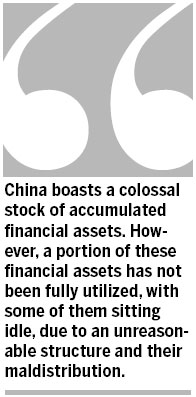

Emphasis needs to be placed on helping the country's real economy, SMEs in particular, gain easier access to funds

The Third Plenary Session of the 18th National Congress of the Communist Party of China is expected to set the tone for new reforms in the coming years, and there are high expectations that it will signal further financial reforms.
To eliminate the structural imbalances in the country's financial sector will be a key issue in any financial reforms. Aside from the marketization of its interest and exchange rates, the emphasis should be on how to raise the efficiency of its financial resources distribution and how to help its real economic activities gain easier access to financial support.
China boasts a colossal stock of accumulated financial assets. However, a portion of these financial assets has not been fully utilized, with some of them sitting idle, due to an unreasonable structure and their maldistribution.
The country's current financial system, which is mainly based on banking loans, has given a helping hand to the development of its sprawling manufacturing and infrastructure sectors, but there has been insufficient financial support for high-tech, services and small and medium-sized enterprises. Due to their longstanding preference for large projects and large companies, China's banking loans have mainly flown to government-subsidized projects, State-owned or large-sized enterprises, and dominant traditional industries while leaving many small and less powerful companies, mostly privately-run, desperately hungry for funds. For example, the large amount of credit that has gone to real estate and government-sponsored investment projects has served as a factor behind the lackluster development of small and medium-sized manufacturers.
The irrational prosperity of financial products has also "squeezed" real economic activities. The rocketing social financing scale and a sharp rise in the volumes of off-balance-sheet financing and bonds financing since 2011 have been in sharp contrast with the continuous deceleration of the country's national economic growth and the downturn of its macroeconomic output. A large volume of additional currency supply has been injected into the market, but the lion's share has not entered the real economy. The direct consequence of this is the weakness of industrial production, manufacturing investment and commodities circulation. At the same time, the rising debt ratio and banks' hidden non-performing assets also pose huge risks.